MGT2230 Report: Customer Information Privacy Security Analysis
VerifiedAdded on 2022/08/08
|6
|987
|22
Report
AI Summary
This report delves into the critical topic of customer information privacy and security, focusing on the Canadian context. It begins with an overview of Canadian privacy law, including the Personal Information Protection and Electronic Documents Act (PIPEDA), and its role in governing the collection, use, and disclosure of personal information. The report examines the challenges businesses face, such as the adaptation of privacy laws to big data, and the balance between data security and information sharing. It includes secondary research, legal requirements, and recommendations for businesses to protect customer data. The report also highlights the importance of informing individuals about data usage and implementing robust data decomposition practices to prevent security breaches. Finally, it provides conclusions and references to support the analysis. The report emphasizes the need for businesses to adhere to legal requirements and adopt best practices for data protection.
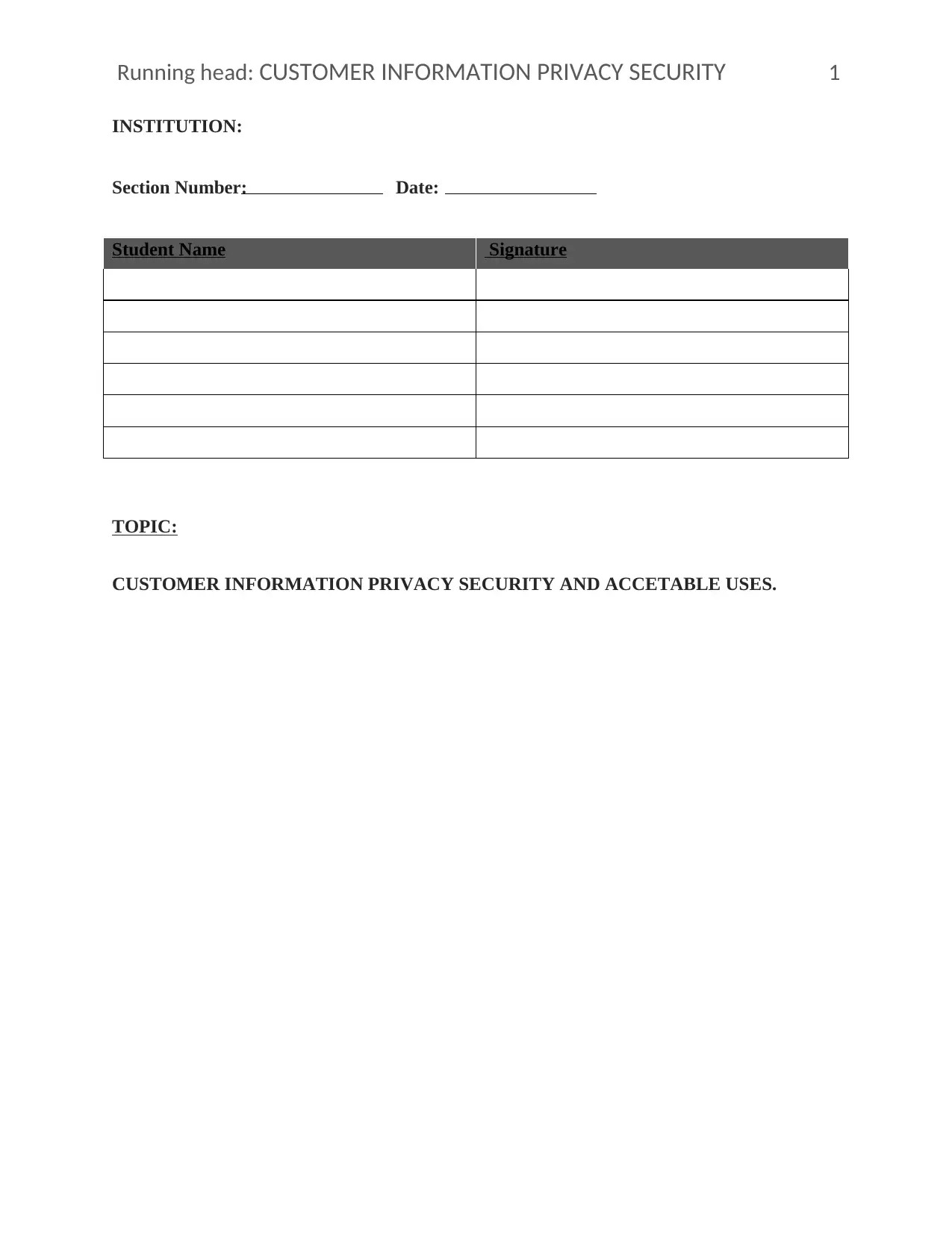
Running head: CUSTOMER INFORMATION PRIVACY SECURITY 1
INSTITUTION:
Section Number: Date:
Student Name Signature
TOPIC:
CUSTOMER INFORMATION PRIVACY SECURITY AND ACCETABLE USES.
INSTITUTION:
Section Number: Date:
Student Name Signature
TOPIC:
CUSTOMER INFORMATION PRIVACY SECURITY AND ACCETABLE USES.
Paraphrase This Document
Need a fresh take? Get an instant paraphrase of this document with our AI Paraphraser
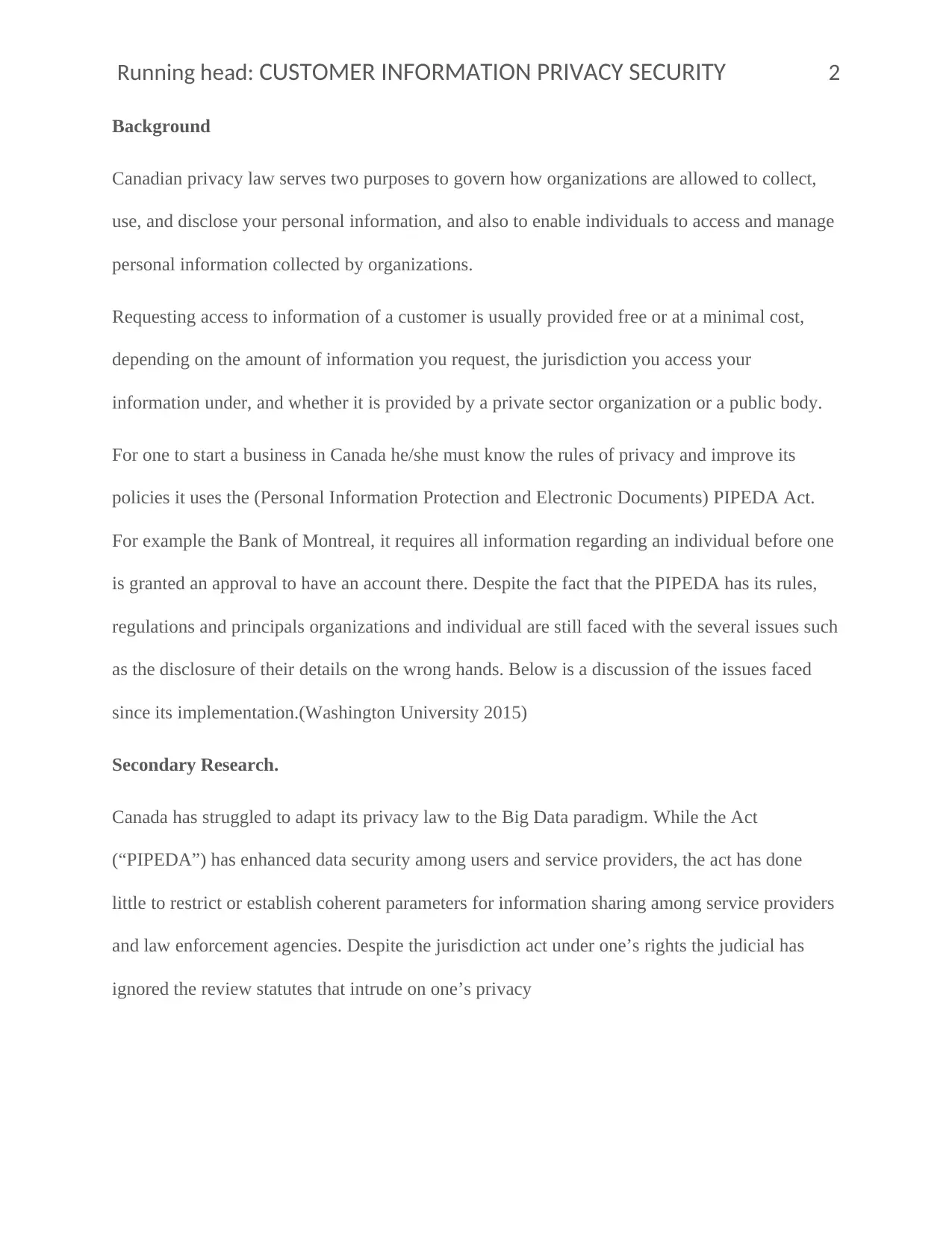
Running head: CUSTOMER INFORMATION PRIVACY SECURITY 2
Background
Canadian privacy law serves two purposes to govern how organizations are allowed to collect,
use, and disclose your personal information, and also to enable individuals to access and manage
personal information collected by organizations.
Requesting access to information of a customer is usually provided free or at a minimal cost,
depending on the amount of information you request, the jurisdiction you access your
information under, and whether it is provided by a private sector organization or a public body.
For one to start a business in Canada he/she must know the rules of privacy and improve its
policies it uses the (Personal Information Protection and Electronic Documents) PIPEDA Act.
For example the Bank of Montreal, it requires all information regarding an individual before one
is granted an approval to have an account there. Despite the fact that the PIPEDA has its rules,
regulations and principals organizations and individual are still faced with the several issues such
as the disclosure of their details on the wrong hands. Below is a discussion of the issues faced
since its implementation.(Washington University 2015)
Secondary Research.
Canada has struggled to adapt its privacy law to the Big Data paradigm. While the Act
(“PIPEDA”) has enhanced data security among users and service providers, the act has done
little to restrict or establish coherent parameters for information sharing among service providers
and law enforcement agencies. Despite the jurisdiction act under one’s rights the judicial has
ignored the review statutes that intrude on one’s privacy
Background
Canadian privacy law serves two purposes to govern how organizations are allowed to collect,
use, and disclose your personal information, and also to enable individuals to access and manage
personal information collected by organizations.
Requesting access to information of a customer is usually provided free or at a minimal cost,
depending on the amount of information you request, the jurisdiction you access your
information under, and whether it is provided by a private sector organization or a public body.
For one to start a business in Canada he/she must know the rules of privacy and improve its
policies it uses the (Personal Information Protection and Electronic Documents) PIPEDA Act.
For example the Bank of Montreal, it requires all information regarding an individual before one
is granted an approval to have an account there. Despite the fact that the PIPEDA has its rules,
regulations and principals organizations and individual are still faced with the several issues such
as the disclosure of their details on the wrong hands. Below is a discussion of the issues faced
since its implementation.(Washington University 2015)
Secondary Research.
Canada has struggled to adapt its privacy law to the Big Data paradigm. While the Act
(“PIPEDA”) has enhanced data security among users and service providers, the act has done
little to restrict or establish coherent parameters for information sharing among service providers
and law enforcement agencies. Despite the jurisdiction act under one’s rights the judicial has
ignored the review statutes that intrude on one’s privacy
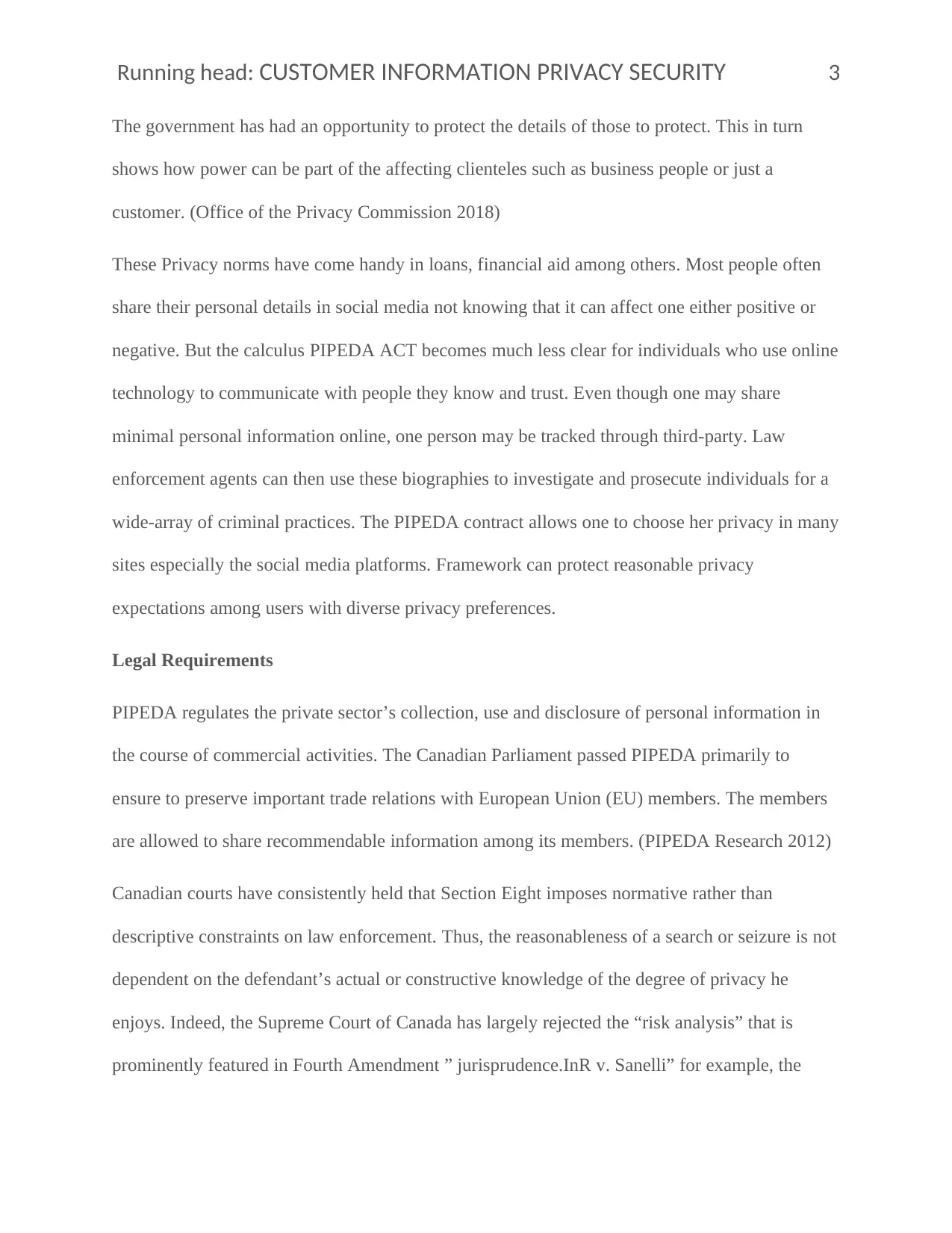
Running head: CUSTOMER INFORMATION PRIVACY SECURITY 3
The government has had an opportunity to protect the details of those to protect. This in turn
shows how power can be part of the affecting clienteles such as business people or just a
customer. (Office of the Privacy Commission 2018)
These Privacy norms have come handy in loans, financial aid among others. Most people often
share their personal details in social media not knowing that it can affect one either positive or
negative. But the calculus PIPEDA ACT becomes much less clear for individuals who use online
technology to communicate with people they know and trust. Even though one may share
minimal personal information online, one person may be tracked through third-party. Law
enforcement agents can then use these biographies to investigate and prosecute individuals for a
wide-array of criminal practices. The PIPEDA contract allows one to choose her privacy in many
sites especially the social media platforms. Framework can protect reasonable privacy
expectations among users with diverse privacy preferences.
Legal Requirements
PIPEDA regulates the private sector’s collection, use and disclosure of personal information in
the course of commercial activities. The Canadian Parliament passed PIPEDA primarily to
ensure to preserve important trade relations with European Union (EU) members. The members
are allowed to share recommendable information among its members. (PIPEDA Research 2012)
Canadian courts have consistently held that Section Eight imposes normative rather than
descriptive constraints on law enforcement. Thus, the reasonableness of a search or seizure is not
dependent on the defendant’s actual or constructive knowledge of the degree of privacy he
enjoys. Indeed, the Supreme Court of Canada has largely rejected the “risk analysis” that is
prominently featured in Fourth Amendment ” jurisprudence.InR v. Sanelli” for example, the
The government has had an opportunity to protect the details of those to protect. This in turn
shows how power can be part of the affecting clienteles such as business people or just a
customer. (Office of the Privacy Commission 2018)
These Privacy norms have come handy in loans, financial aid among others. Most people often
share their personal details in social media not knowing that it can affect one either positive or
negative. But the calculus PIPEDA ACT becomes much less clear for individuals who use online
technology to communicate with people they know and trust. Even though one may share
minimal personal information online, one person may be tracked through third-party. Law
enforcement agents can then use these biographies to investigate and prosecute individuals for a
wide-array of criminal practices. The PIPEDA contract allows one to choose her privacy in many
sites especially the social media platforms. Framework can protect reasonable privacy
expectations among users with diverse privacy preferences.
Legal Requirements
PIPEDA regulates the private sector’s collection, use and disclosure of personal information in
the course of commercial activities. The Canadian Parliament passed PIPEDA primarily to
ensure to preserve important trade relations with European Union (EU) members. The members
are allowed to share recommendable information among its members. (PIPEDA Research 2012)
Canadian courts have consistently held that Section Eight imposes normative rather than
descriptive constraints on law enforcement. Thus, the reasonableness of a search or seizure is not
dependent on the defendant’s actual or constructive knowledge of the degree of privacy he
enjoys. Indeed, the Supreme Court of Canada has largely rejected the “risk analysis” that is
prominently featured in Fourth Amendment ” jurisprudence.InR v. Sanelli” for example, the
⊘ This is a preview!⊘
Do you want full access?
Subscribe today to unlock all pages.

Trusted by 1+ million students worldwide
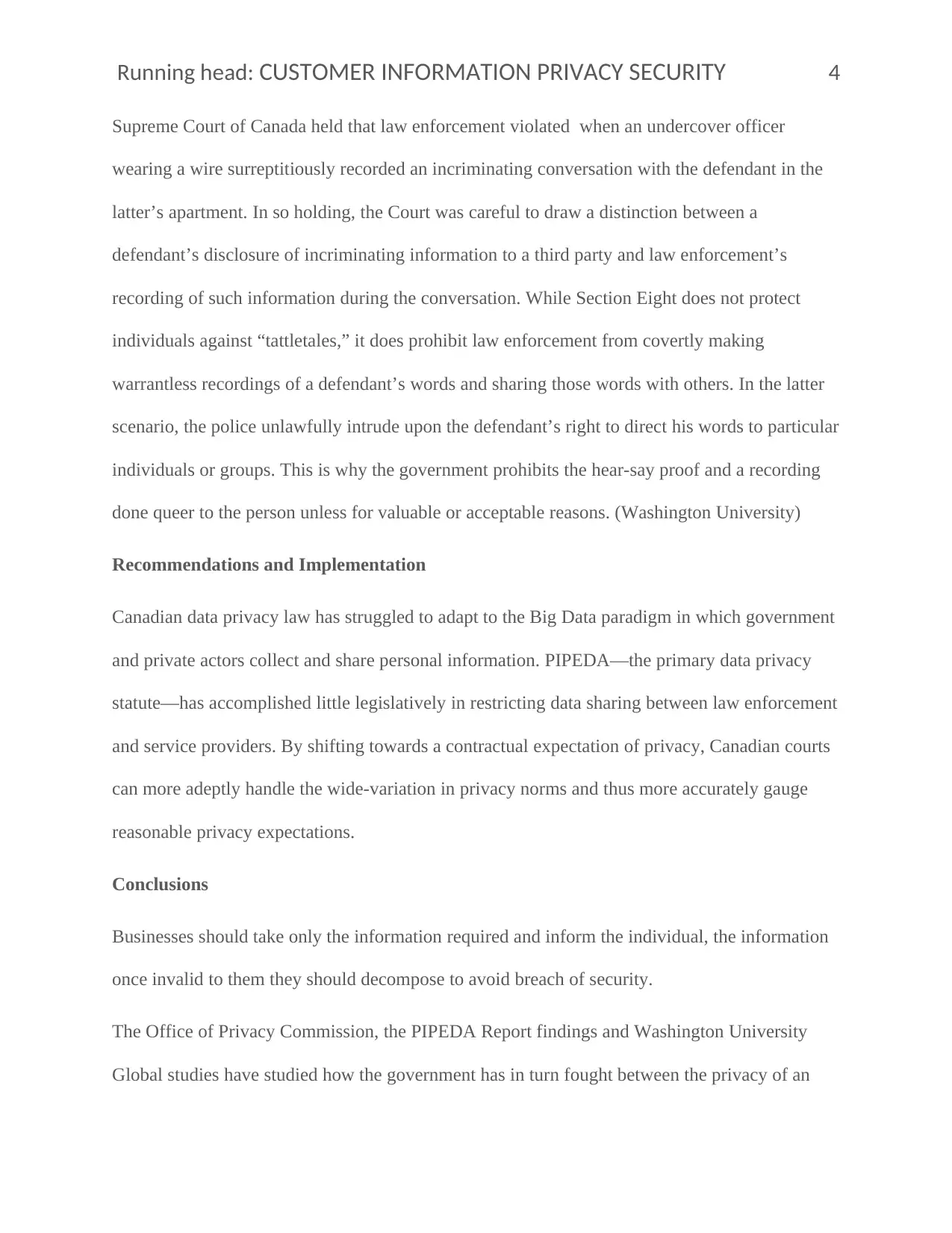
Running head: CUSTOMER INFORMATION PRIVACY SECURITY 4
Supreme Court of Canada held that law enforcement violated when an undercover officer
wearing a wire surreptitiously recorded an incriminating conversation with the defendant in the
latter’s apartment. In so holding, the Court was careful to draw a distinction between a
defendant’s disclosure of incriminating information to a third party and law enforcement’s
recording of such information during the conversation. While Section Eight does not protect
individuals against “tattletales,” it does prohibit law enforcement from covertly making
warrantless recordings of a defendant’s words and sharing those words with others. In the latter
scenario, the police unlawfully intrude upon the defendant’s right to direct his words to particular
individuals or groups. This is why the government prohibits the hear-say proof and a recording
done queer to the person unless for valuable or acceptable reasons. (Washington University)
Recommendations and Implementation
Canadian data privacy law has struggled to adapt to the Big Data paradigm in which government
and private actors collect and share personal information. PIPEDA—the primary data privacy
statute—has accomplished little legislatively in restricting data sharing between law enforcement
and service providers. By shifting towards a contractual expectation of privacy, Canadian courts
can more adeptly handle the wide-variation in privacy norms and thus more accurately gauge
reasonable privacy expectations.
Conclusions
Businesses should take only the information required and inform the individual, the information
once invalid to them they should decompose to avoid breach of security.
The Office of Privacy Commission, the PIPEDA Report findings and Washington University
Global studies have studied how the government has in turn fought between the privacy of an
Supreme Court of Canada held that law enforcement violated when an undercover officer
wearing a wire surreptitiously recorded an incriminating conversation with the defendant in the
latter’s apartment. In so holding, the Court was careful to draw a distinction between a
defendant’s disclosure of incriminating information to a third party and law enforcement’s
recording of such information during the conversation. While Section Eight does not protect
individuals against “tattletales,” it does prohibit law enforcement from covertly making
warrantless recordings of a defendant’s words and sharing those words with others. In the latter
scenario, the police unlawfully intrude upon the defendant’s right to direct his words to particular
individuals or groups. This is why the government prohibits the hear-say proof and a recording
done queer to the person unless for valuable or acceptable reasons. (Washington University)
Recommendations and Implementation
Canadian data privacy law has struggled to adapt to the Big Data paradigm in which government
and private actors collect and share personal information. PIPEDA—the primary data privacy
statute—has accomplished little legislatively in restricting data sharing between law enforcement
and service providers. By shifting towards a contractual expectation of privacy, Canadian courts
can more adeptly handle the wide-variation in privacy norms and thus more accurately gauge
reasonable privacy expectations.
Conclusions
Businesses should take only the information required and inform the individual, the information
once invalid to them they should decompose to avoid breach of security.
The Office of Privacy Commission, the PIPEDA Report findings and Washington University
Global studies have studied how the government has in turn fought between the privacy of an
Paraphrase This Document
Need a fresh take? Get an instant paraphrase of this document with our AI Paraphraser

Running head: CUSTOMER INFORMATION PRIVACY SECURITY 5
individual due to its threat of getting to the wrong hands but in turn it has also fought on how the
information might be used to help in aids among others.
individual due to its threat of getting to the wrong hands but in turn it has also fought on how the
information might be used to help in aids among others.
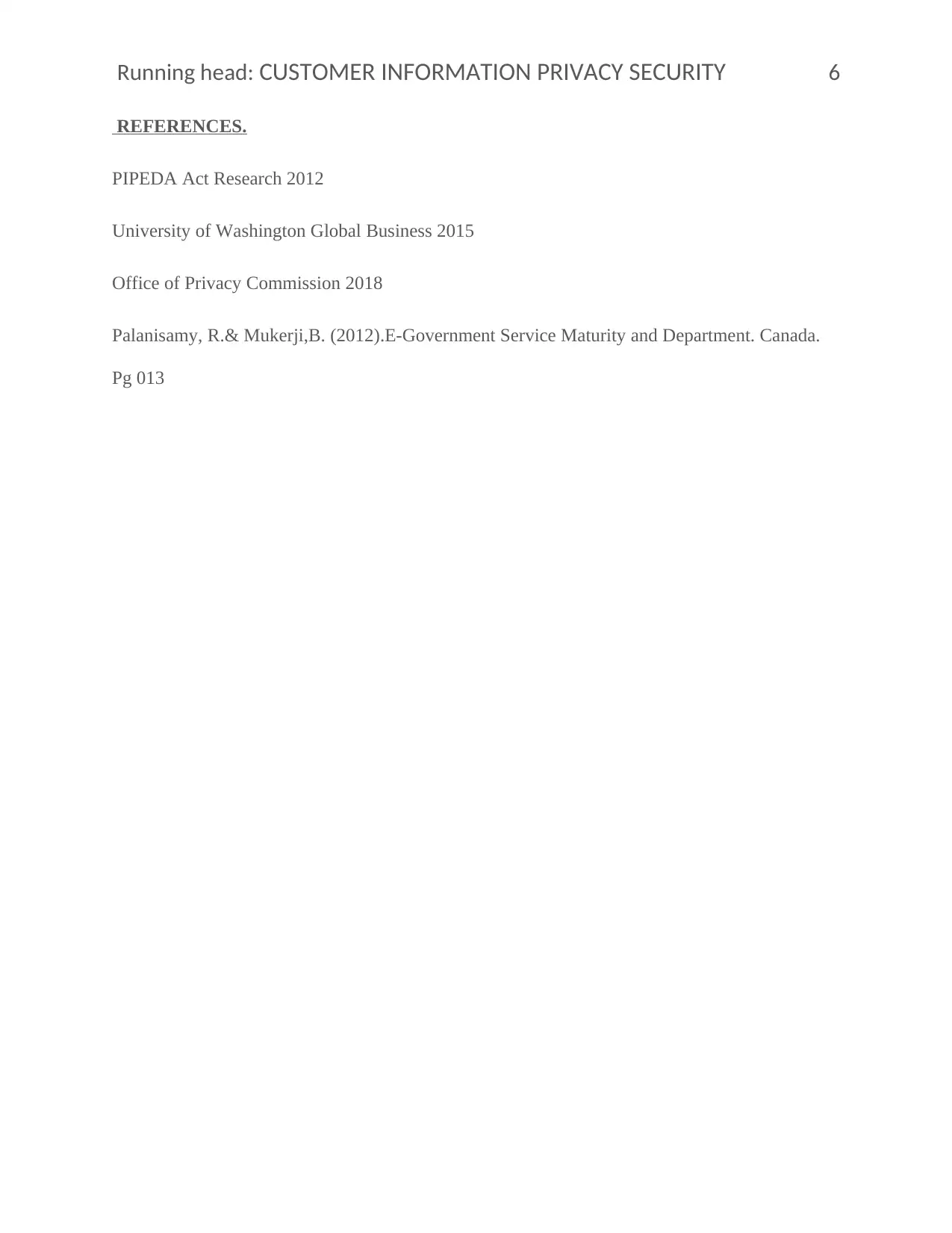
Running head: CUSTOMER INFORMATION PRIVACY SECURITY 6
REFERENCES.
PIPEDA Act Research 2012
University of Washington Global Business 2015
Office of Privacy Commission 2018
Palanisamy, R.& Mukerji,B. (2012).E-Government Service Maturity and Department. Canada.
Pg 013
REFERENCES.
PIPEDA Act Research 2012
University of Washington Global Business 2015
Office of Privacy Commission 2018
Palanisamy, R.& Mukerji,B. (2012).E-Government Service Maturity and Department. Canada.
Pg 013
⊘ This is a preview!⊘
Do you want full access?
Subscribe today to unlock all pages.

Trusted by 1+ million students worldwide
1 out of 6
Related Documents
Your All-in-One AI-Powered Toolkit for Academic Success.
+13062052269
info@desklib.com
Available 24*7 on WhatsApp / Email
![[object Object]](/_next/static/media/star-bottom.7253800d.svg)
Unlock your academic potential
Copyright © 2020–2026 A2Z Services. All Rights Reserved. Developed and managed by ZUCOL.





